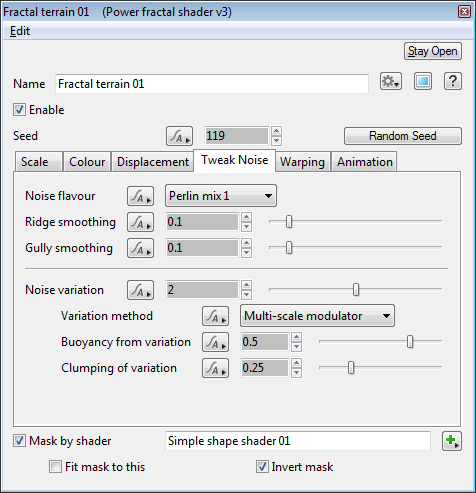Difference between revisions of "Power Fractal Shader v3 - Tweak Noise Tab"
| Line 1: | Line 1: | ||
| − | [[ | + | [[Image:drex_module_157_3_image_0.png|center|Power Fractal Shader v3 - Tweak Noise Tab]] |
| − | + | ||
| + | '''Description: '''<br /> | ||
| + | In this tab, all parameters that affect the "Noise" for the fractal are accessible. In relation to fractals, "Noise" is a pseudo-random, space-filling texture primitive. The actual look of the generated texture changes by choosing a different seed from which the noise functions begins to calculate. Think of "noise" as a way to add pseudo-random variation to a fractal, which by definition is self-similar over all magnitudes. So "noise" combined with the structures pre-defined by a fractal produces a multi-dimensional density function, which TG uses e.g. for procedural terrain generation, clouds, but also mask, displacements, colouring of structures, etc. | ||
| + | |||
| + | |||
| + | '''Settings:'''<br /> | ||
| + | |||
| + | * '''Noise Flavour''' TG currently supports five different flavours of noise functions: Perlin, Perlin Billow, Perlin Ridged, Perlin Mix 1 and 2 (which are a particular combination of the first three). The most fundamental characteristics of the final density function generated by a Power Fractal are determined by the flavour of noise chosen in this tab. | ||
| + | * '''Noise Variation:'''<br /> Sets the overall noise variation. At value 0, the noise generated shows an even distribution of small and large texture components. At higher values, the noise varies more unevenly - creating a noise texture with an uneven amount of large and small features. | ||
| + | * '''Variation Method:''' TBC | ||
| + | * '''Buoyancy from variation:''' Adjusts how "quickly" the variation itself changes over the dimensions of the variation. | ||
| + | * '''Clumping of variation:''' Adjusts the distribution of variation changes. Higher values result in a "clumping" effect. For example, when the fractal is used for creating a procedural terrain, a high clumping value would account for distinct areas of plains and mountains - especially when combined with a higher than default value for "noise variation". | ||
| + | * '''Noise Stretch:''' This parameter allows you to stretch the noise in the X, Y and Z dimensions. | ||
| − | |||
Back to: [[Power Fractal Shader v3]] | Back to: [[Power Fractal Shader v3]] | ||
| − | |||
| − | |||
Revision as of 11:05, 24 May 2013
Description:
In this tab, all parameters that affect the "Noise" for the fractal are accessible. In relation to fractals, "Noise" is a pseudo-random, space-filling texture primitive. The actual look of the generated texture changes by choosing a different seed from which the noise functions begins to calculate. Think of "noise" as a way to add pseudo-random variation to a fractal, which by definition is self-similar over all magnitudes. So "noise" combined with the structures pre-defined by a fractal produces a multi-dimensional density function, which TG uses e.g. for procedural terrain generation, clouds, but also mask, displacements, colouring of structures, etc.
Settings:
- Noise Flavour TG currently supports five different flavours of noise functions: Perlin, Perlin Billow, Perlin Ridged, Perlin Mix 1 and 2 (which are a particular combination of the first three). The most fundamental characteristics of the final density function generated by a Power Fractal are determined by the flavour of noise chosen in this tab.
- Noise Variation:
Sets the overall noise variation. At value 0, the noise generated shows an even distribution of small and large texture components. At higher values, the noise varies more unevenly - creating a noise texture with an uneven amount of large and small features. - Variation Method: TBC
- Buoyancy from variation: Adjusts how "quickly" the variation itself changes over the dimensions of the variation.
- Clumping of variation: Adjusts the distribution of variation changes. Higher values result in a "clumping" effect. For example, when the fractal is used for creating a procedural terrain, a high clumping value would account for distinct areas of plains and mountains - especially when combined with a higher than default value for "noise variation".
- Noise Stretch: This parameter allows you to stretch the noise in the X, Y and Z dimensions.
Back to: Power Fractal Shader v3
A parameter is an individual setting in a node parameter view which controls some aspect of the node.
